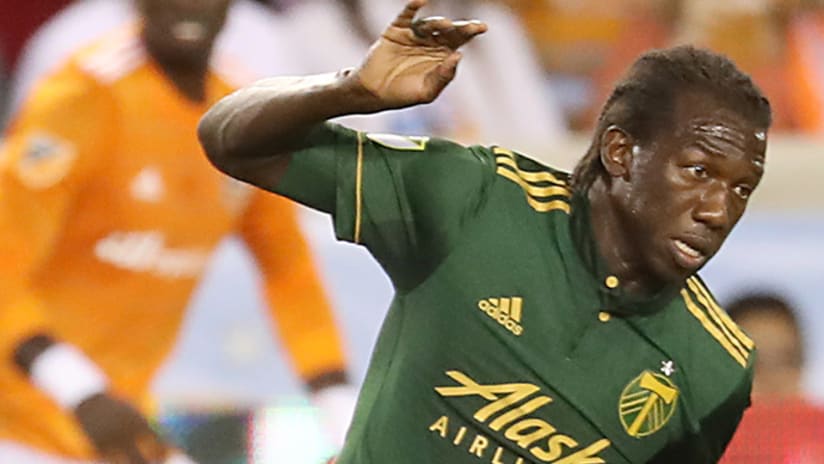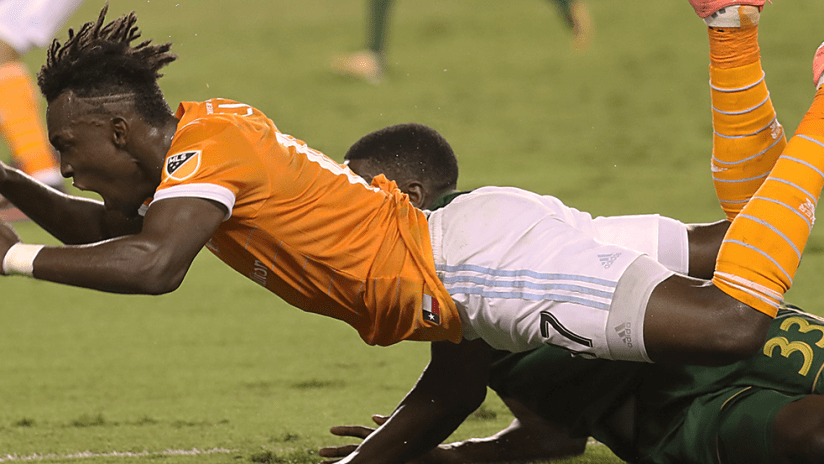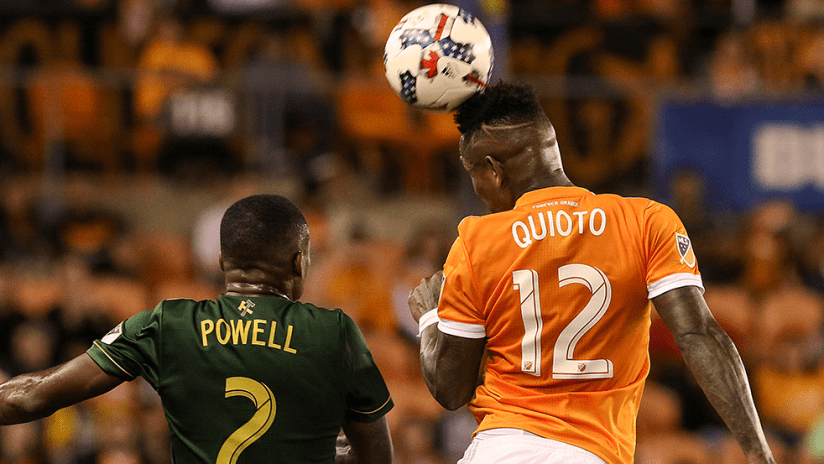HOUSTON — Four shots on target. A scoreless draw. Probably not what many expected from the two best attacking sides in the Western Conference.
But an uneven field at BBVA Compass Stadium helped contribute to wayward shooting in their Conference Semifinal 1st leg, especially when Darlington Nagbe squandered a clear look at goal for the Portland Timbers in the first half, scuffing his shot woefully wide.
“The field’s very difficult to really put much together and a couple of the chances we had kind of jumped up,” said Timbers head coach Caleb Porter. “Nagbe’s [shot] is a good example. On a good pitch, he’s burying that; [but] it jumps up on him. They had a couple, too, shots that bobble up on you.”
“You’ve got two of the best attacking teams in Houston and ourselves and neither team was really able to generate and play the way they wanted to play.”
The Dynamo, who scored 45 times at home in the MLS regular season, did not find the net in front of their own fans over 90 minutes for the second time in four days. Last Thursday, they outlasted Sporting Kansas City in a 1-0 extra-time Knockout Round victory.
“I’m not here to jam Houston, their field, I know they have challenges with regards to football playing on it, but it’s not great in a showcase game like this with two attacking teams to have to play,” Porter said. “In my five years, I hate to say it but it’s the worst field that I’ve seen in five years in this league. It’s just really difficult.”
The Dynamo’s attack lacked its usual explosive pace on the wings. Portland defender Liam Ridgewell said that each side suffered. “Both teams couldn’t really play too much around the back into midfield, you had to go a little bit longer, a little more direct, and try and play on the counter a little bit.
“I don’t think it helped us at all. We like to play football, we like to play it around the back, we like to play it through midfield and build up,” he said. “I think it hampered both teams in the end, how they wanted to play.”
Houston’s brutal summer heat has factored into the field conditions. The surface was relaid in May last year with Bermuda grass because the previous Ryegrass field struggled as spring turned to summer.
Drainage improvements in recent years meant that Hurricane Harvey, which dropped around 50 inches of rain over some parts of the city, did not have any lasting impact. In fact, the field was in decent condition until a few weeks ago when extensive use appeared to take a toll.
The stadium hosts Dynamo and NWSL Dash matches, Texas Southern University football games and international club and country exhibitions. Three football games have taken place since September 7, and Monday’s soccer match was the seventh of the month and the second in the last four days.
“We were all talking about it [in the locker room],” said Dynamo forward Mauro Manotas. “It was bad. It can’t be, that days before an important match they use it to play football or for something else. It's very difficult.
“The field had been great throughout the regular season, and we'd played some great games because the field was great. In the end, it’s not an excuse – but as you guys know, with a good field, everything's better.”
BBVA Compass Stadium EVP and GM Juan Rodriguez issued a statement on Tuesday in response to the comments on the playing surface.
“That is not the perception that we want of our field or our facility," he said. “We are continuously looking for ways to improve the experience at BBVA Compass Stadium for the players on the field we well as the fans in the stands. We have taken and will continue to take steps to provide the best quality playing surface for every game at our facility. We know that creating a strong and durable playing surface is a long-term process, but we are taking proactive intermediate steps to prepare the field for a potential home playoff game on November 21.”












